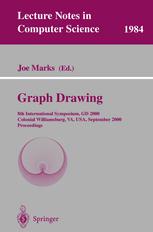

Most ebook files are in PDF format, so you can easily read them using various software such as Foxit Reader or directly on the Google Chrome browser.
Some ebook files are released by publishers in other formats such as .awz, .mobi, .epub, .fb2, etc. You may need to install specific software to read these formats on mobile/PC, such as Calibre.
Please read the tutorial at this link: https://ebookbell.com/faq
We offer FREE conversion to the popular formats you request; however, this may take some time. Therefore, right after payment, please email us, and we will try to provide the service as quickly as possible.
For some exceptional file formats or broken links (if any), please refrain from opening any disputes. Instead, email us first, and we will try to assist within a maximum of 6 hours.
EbookBell Team

5.0
50 reviewsThis year’s meeting marked the Eighth International Symposium on Graph D- wing. The organizing and program committees worked hard to make this year’s symposium possible, and we were delighted that so many people came to - lonial Williamsburg, Virginia, for three days of the latest results in the eld of graph drawing. As in previous years, the review process was quite competitive. We accepted 30 out of 53 regular-length submissions, and 5 out of 15 short submissions, for a total acceptance ratio of 35 out of 68, or 51%. This year’s program featured several new developments in the eld. Four di erent approaches for handling very large graphs were presented in a session on force-directed layout. Two sessions were devoted to the latest advances in orthogonal graph drawing. And alongside the usual mix of theory and practice papers we had several contributions based on empirical studies of users and of systems. Our invited talks were given by two speakers who were new to most members of the GD community, but who work in areas that are closely related to graph drawing. Professor Colin Ware of the University of New Hampshire told us how knowledge of human visual perception is useful for the design of e ective data visualizations. And Professor David Jensen of the University of Massachusetts at Amherst talked about the process of knowledge discovery from graphs, a process that involves more than just graph drawing and visualization.